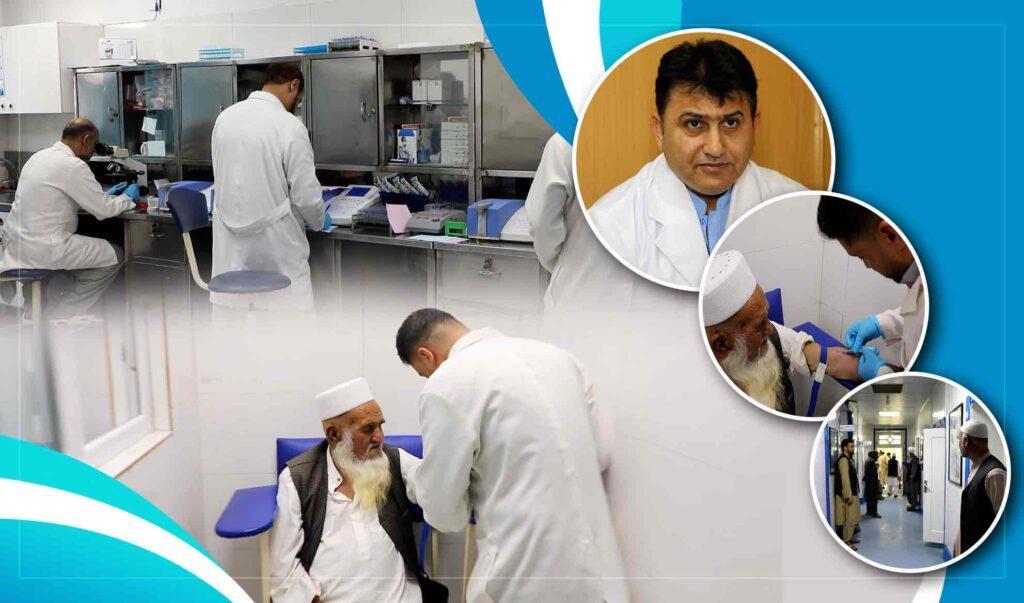
Diabetes: False Beliefs Keep Patients From Proper Treatment
KABUL (Pajhwok): Some doctors and officials from the Afghanistan's Ministry of Public Health (MoPH) say the number of people suffering from diabetes is steadily increasing.
They warn that false beliefs about diet and herbal medicines are among the biggest obstacles to effective diabetes control - a condition that can lead to blindness, kidney failure, and even limb amputation.
MoPH: Diabetes cases rising in Afghanistan, worldwide.
Sharafat Zaman, spokesperson for the Ministry of Public Health, told Pajhwok Afghan News that diabetes cases are rising both in Afghanistan and across the world.
He did not provide specific figures, but said the ministry provided nearly 20,000 inpatient services for diabetes patients last year. However, he noted that this number does not reflect the full scale of the problem, as many patients seek treatment in the private sector.
According to Zaman, diabetes prevalence is increasing in Afghanistan, and raising public awareness is key to reducing it.
He added that the ministry has organized seminars and launched awareness campaigns through social media to educate the public.
“The MoPH has multiple centers across the country and continues to expand its efforts to combat this disease,” he said, noting that while progress has been made, more needs to be done.
Zaman also emphasized that while the ministry continues to fight infectious diseases, addressing non-communicable diseases such as diabetes has become a priority.
Numbers from WHO, the center for diabetes control, treatment
According to the Center for Diabetes Control and Treatment,“Current estimates show that more than one million Afghans are diabetic. However, the prevalence in the general population is estimated to be between 5% and 9%. Considering Afghanistan's population of over 30 million, it is likely that another one to two million people have diabetes but remain undiagnosed.”
The center added that Afghanistan's aging population, increasing urbanization, carbohydrate-rich diet, rising obesity, and sedentary lifestyle are all major risk factors for diabetes.
The World Health Organization (WHO) also recently reported that diabetes - along with heart disease and cancer - is on the rise in Afghanistan, though it did not provide specific figures.
Doctors: False beliefs and low awareness hinder effective treatment
Dr. Ahmad Kamran Salehzada, an internal medicine specialist and medical advisor at the Diabetes Control Center in Kabul, told Pajhwok that diabetes can affect people of all ages and no one is immune.
“Obesity, lack of physical activity, unhealthy eating habits, genetic factors, and late diagnosis are among the main causes,” he said.
Highlighting false beliefs surrounding the disease, he explained:“Many people think diabetes can be controlled only through diet or that insulin harms the bones - whereas, in many cases, insulin is the only effective treatment.”
Dr. Salehzada noted that one major reason patients use un-prescribed medicines or avoid visiting doctors is their limited understanding of the disease's risks.
“Unfortunately, public awareness before the onset of diabetes is very low,” he said.“Some people believe the disease can be fully controlled through food alone - a misconception that can be dangerous.”
He added:“Traditional medicine has an important place in medical history and forms the basis of modern medicine - we do not deny that. But with advances in science and the development of highly effective modern drugs, these industrially produced medicines are generally safer and more reliable than herbal remedies, which may have limited benefits.”
Dr. Salehzada said that many patients only seek medical help after their condition worsens because they ignore dietary restrictions or delay treatment.
Similarly, Dr. Emal Munib, another internal medicine specialist, confirmed Dr. Salehzada's account, calling lack of awareness and failure to seek proper medical care as major challenges.
“Many diabetes patients believe they can be cured through prayers and charms,” he said.“Some tell us, 'We went to a mullah who prayed for us, and our diabetes disappeared, so we stopped taking medicine.' Others say, 'Everyone has diabetes - it's just something doctors made up.'”
Dr. Munib added that some patients try to control their blood sugar using herbal remedies, which often worsens their condition.
“For example,” he said,“some claim they ate the leaves or roots of certain plants to cure their diabetes - these are extremely misguided beliefs.”
Doctors Recommend: Combine Medication with Exercise and a Strict Diet
Dr. Munib advised:“First of all, patients should keep their blood sugar under control. Secondly, they must ignore superstitions and unscientific claims. When blood sugar is controlled, the body remains healthy - but when it gets out of control, serious complications are inevitable. Patients must follow dietary restrictions, take their medication regularly, and engage in physical activity, especially exercise.”
Both doctors emphasized that medical treatment is essential. Ignoring diabetes or discontinuing prescribed medication can cause blood sugar levels to spike dangerously, leading to severe complications such as limb amputation, kidney failure, heart disease, or blindness.
They recommend that patients monitor their blood sugar regularly, maintain a balanced diet, adhere strictly to dietary guidelines, and exercise - particularly through regular walking.
Afghan Patients: From faith in herbal remedies to the risk of amputation
Some diabetes patients in Afghanistan say that relying on herbal remedies and unscientific treatments not only failed to improve their condition but worsened it - in some cases, nearly leading to amputation.
Abdul Aziz, 53, a resident of Nangarhar province, said he has lived with diabetes for five years. Initially, he used Greek (Unani) herbal medicines but saw no improvement, and his condition deteriorated until he began taking prescribed medication. After a period of stability, however, he stopped his medicine.
“I stopped taking my medicine for a while,” he said.“During winter, my foot developed blisters, and the wound turned black and wouldn't heal. I came to Kabul, where I was referred to the Diabetes Treatment Center in Shahr-e-Naw. They dressed my wound several times; at first, they said it might need amputation, but thank God, the treatment worked, and I recovered.”
Likewise, Zainuddin Bakhtani, a resident of Kabul's Khairkhana area who has been suffering from diabetes for 20 years, said that at first he relied more on herbal treatments than modern medicine.
“I used many herbal mixtures - for example, I boiled neem seeds, fenugreek, and bitter melon and drank the liquid,” he said.“But none of it helped. My blood sugar rose dramatically until I finally went to a doctor. Now I take my medicine regularly.”
Rahmatullah, a resident of Kabul's 2nd district, said he has had diabetes for 15 years. Two years ago, when he stopped treatment, his sugar levels increased and required surgery.
“Last year, my sugar went very high, and my foot was close to being amputated,” he said.“The doctor took an X-ray and said it hadn't reached the bone - otherwise, it would have been cut off. They performed surgery and cleaned the infected tissue. I got somewhat better afterward.”
He added:“Even now, doctors tell me that you must be your own doctor - if you follow your diet, your sugar won't rise again; if you don't, it will, and you could lose your foot.”
Rahmatullah said he now takes his medicine regularly, follows a strict diet, and exercises consistently, which has helped him keep his blood sugar under control.
sa/ma

Legal Disclaimer:
MENAFN provides the
information “as is” without warranty of any kind. We do not accept
any responsibility or liability for the accuracy, content, images,
videos, licenses, completeness, legality, or reliability of the information
contained in this article. If you have any complaints or copyright
issues related to this article, kindly contact the provider above.


















Comments
No comment